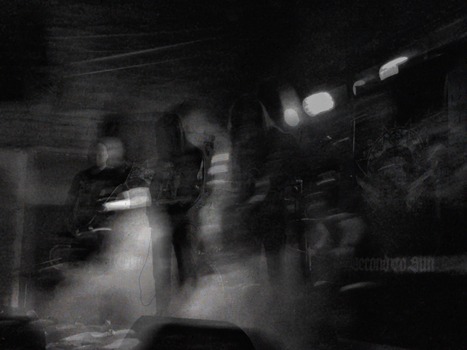Considering the band’s more groove metal take on black metal in their inception, they’ve grown further and further into dark and icy black metal waters with each release. Leviathan, as their newest release, continues the band’s evolution and takes further steps in that direction. Though it never comes at the expensive of keeping the band’s sound an interesting one, and one that finds time for some great eerie melodies within. Guitarist Vladmir Lehtinen responded to some of our email inquiries about the act, and provides some insights into Leviathan, the band’s frequent output, and enjoyment of Scandinavian black metal.
Dead Rhetoric: Second to Sun has been pretty prolific in recent years, with 4 full-lengths now in the last four years. Anything in particular you can attribute that to?
Vladimir Lehtinen: I think you have to separate a musician that you see on stage doing live-shows and a musician-creator, who’s ready to create stuff. I want to create, and that’s what I’m doing.
Dead Rhetoric: The sound of Second to Sun has also been evolving with each new release. Do you feel you are the type of band that continues to take steps forward with each new offering?
Lehtinen: Hard to answer this question. I think our fans, or haters, or just those who love our music can say that in particular how to answer that.
Dead Rhetoric: What is the essence of Second to Sun (and your sound), at this point in time?
Lehtinen: I believe it’s very cold, dark and heavy music, not devoid of melody and ideology, with roots going deep into black metal.
Dead Rhetoric: What makes Leviathan stand out to you, as the band’s latest work?
Lehtinen: We tried to make our sound as much scratchy and cold as possible, leaving the impression of merciless fury of Russian blizzard and cold.
Dead Rhetoric: You’ve posted the phrase, “If you do not think about the future, you cannot have one” on Facebook and Bandcamp. How does this apply to Leviathan?
Lehtinen: The album title represents our time, which like Leviathan strikes people with his power. This year was very difficult and we were thinking for a long time should we release this record or not – many bands were afraid to show their creativity, but in the end, the guys agreed with my decision. The phrase is exactly about that, and this album for my band is the future.
Dead Rhetoric: What can you state about the lyrical concepts that are on Leviathan?
Lehtinen: As always, here I can give a very broad answer. First of all, I want to note the ideological concept of the album – there is numerous songs inspired by movies – for example Rainer Sarnet’s November, this is something new for us, and Hail Shaitan! It would be alien for a band from Russia to use satanic themes, so as usual, I turned to the culture of Finno-Ugric folks, and wrote Shaitan, the song about the battle of two tribes and a shaman who appeals to the people with fiery speech and calls to pray to Shaitan.
The album title is partially dedicated to Russian movie Leviathan, and the song “The Engraving of Gustave Dore” is my own peculiar interpretation of it’s idea, based on impression from the original gravure. I think, it has some influence of post-modern, this is the first time for us. Same thing with “Emperor in Hell,” this song’s theme is close to Russian gothic literature and narrates about the Emperor of Russia, who is being killed and goes to Hell with his killer. One part of the song is telling about his memories, and another part is about Satan speeches (or Shaitan). The whole song is dedicated to Hungarian psychoanalyst and paranormal researcher Nandor Fodor. This is the first time in the band’s history too.
Dead Rhetoric: The title track and opening “Eerie” are a bit longer than the others. Did you take any special considerations in songwriting when creating them?
Lehtinen: No, I just wanted to create a long and conceptual song, full of different riffs and not devoid of some phantasmagoria of eeriness. I hope I did well on that.
Dead Rhetoric: You release instrumental versions of your albums as well. What do you specifically enjoy about doing that with the music? Do you feel it gives the songs a different flavor?
Lehtinen: Yes, we always do that, first I’m writing songs, and then making a vocal demo and Gleb is recording vocals. It just happened to start like that. I like to feel that I’m working as a painter and not bounded with bullshit of some mainstream bands, like “we have to make it like that here, because here the vocalist is singing, and here we need to do that, cause we have to”.
I always produce the instrumental versions a bit different, it has more freedom to “breathe” with no vocals, and we have a part of the audience who always listen to instrumental versions. We started this way, and I’m not gonna ditch people.
Dead Rhetoric: As an independent band, how crucial have services like Bandcamp been in generating and expanding your fanbase?
Lehtinen: Sometimes it seems to me that everything rests on them, social media and our website. Also Spotify and Apple Music.
Dead Rhetoric: The band takes some influence from Scandinavian black metal. What drew you in with that particular style of music?
Lehtinen: The feeling that I’m on the same wave with similar artists, this is the source of inspiration and the unlimited individuality, the bar which I can always use to try on. It doesn’t matter – Thorns or Enslaved or Impaled Nazarene, Dark Funeral or Beherit.
Dead Rhetoric: Lastly, is there anything interesting outside of the album release, that the band is up to?
Lehtinen: Sure. Russian tour, European tour, solo projects, and I’m mixing and producing different releases of the band members – new albums of Grima и Ultar are coming soon. So stay tuned!


